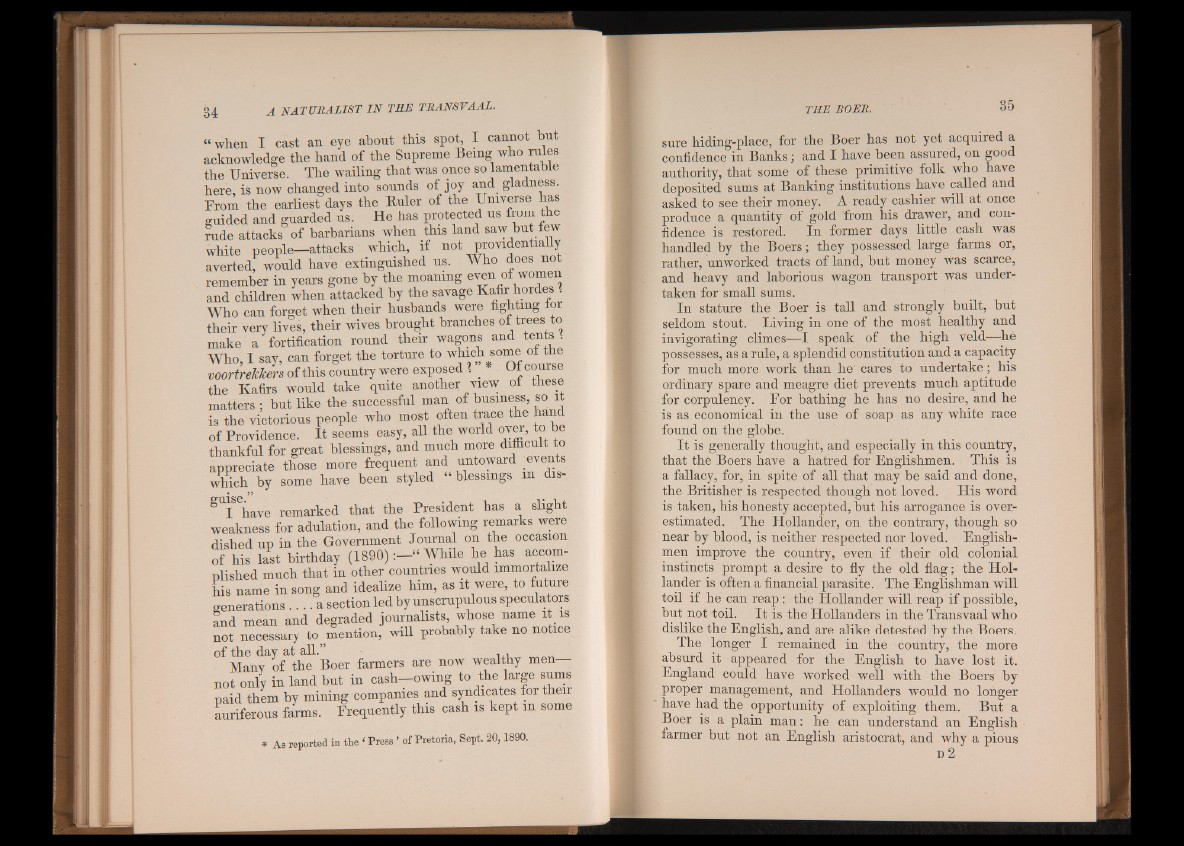
“ when I cast an eye about this spot, I cannot but
acknowledge the hand of the Supreme Being who rules
the Universe. The wailing that was once so lamentable
here, is now changed into sounds of joy and gladness.
From the earliest days the Euler of the Universe has
guided and guarded ns. He has protected us from the
rude attacks of barbarians when this land saw but tew
white people—attacks which, if not providentially
averted, would have extinguished us. Who does not
remember in years gone by the moaning even of women
and children when attacked by the savage Kafir hordes .
Who can forget when their husbands were fighting tor
their very lives, their wives brought branches of trees to
make a fortification round their wagons and tents 5
Who, I say, can forget the torture to which^some ofThe
voortrelcJcers of this country were exposed . . ,
the Kafirs would take quite another view of these
matters ; but like the successful man of business, so it
is the victorious people who most often trace the ha
of Providence. I t seems easy, all the world over, to be
thankful for great blessings, and much more
appreciate those more frequent and untoward events
which by some have been styled “ blessings m dis-
99
gUI 6have remarked that the President has a slight
weakness for adulation, and the following remarks were
dished up in the Government Journal on the occasion
of his last birthday (1890) ■ While be has accomplished
much that in other countries would immortalize
his name in song and idealize him, as it were, to future
generations . . . . a section led by unscrupulous speculators
and mean and degraded journalists, whose name it is
not necessary to mention, will probably take no notice
of the day at all.” ___
Manv of the Boer farmers are now wealthy men
not only in land but in c a s h— owing to the large sums
paid them by mining companies and syndicates for their
«yirifcmns farms. Frequently this cash is kept m some
* As reported in the f Press ’ of Pretoria, Sept. 20,1890.
sure hiding-place, for the Boer has not yet acquired a
confidence in Banks ; and I have been assured, on good
authority, that some of these primitive folk who have
deposited sums at Banking institutions have called and
asked to see their money. A ready cashier will at once
produce a quantity of gold from his drawer, and confidence
is restored. In former days little cash was
handled by the Boers; they possessed large farms or,
rather, unworked tracts of land, but money was scarce,
and heavy and laborious wagon transport was undertaken
for small sums.
In stature the Boer is tall and strongly built, but
seldom stout. Living in one of the most healthy and
invigorating climes—I speak of the high veld—hé
possesses, as a rule, a splendid constitution and a capacity
for much more work than he' cares to undertake ; his
ordinary spare and meagre diet prevents much aptitude
for corpulency. For bathing he has no desire, and he
is as economical in the use of soap as any white race
found on the globe.
It is generally thought, and especially in this country,
that thé Boers have a hatred for Englishmen. This is
a fallacy, for, in spite of ah that may be said and done,
the Britisher is respected though not loved. His word
is taken, his honesty accepted, but his arrogance is overestimated.
The Hollander, on the contrary, though so
near by blood, is neither respected nor loved. Englishmen
improve the country, even if their old colonial
instincts prompt a desire to fly the old flag ; the Hollander
is often a financial parasite. The Englishman will
toil if he can reap : the Hollander will reap if possible,
but not toil. It is the Hollanders in the Transvaal who
dislike the English, and are alike detested by the Boers.
The longer I remained in the country, the more
absurd it appeared for the English to have lost it.
England could have worked well with the Boers by
proper management, and Hollanders would no longer
have had the opportunity of exploiting them. But a
Boer is a plain man : he can understand an English
farmer but not an English aristocrat, and why a pious
D 2